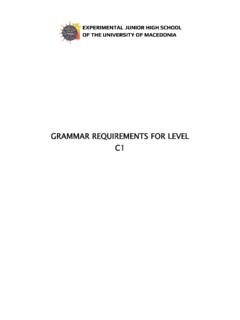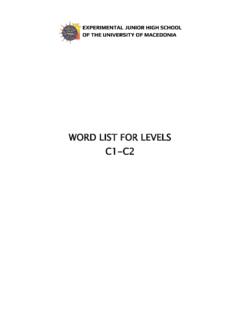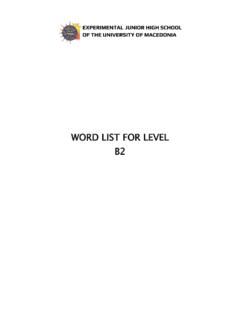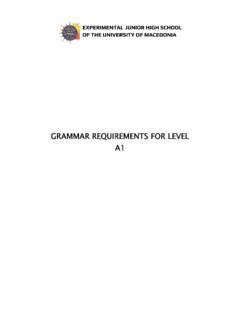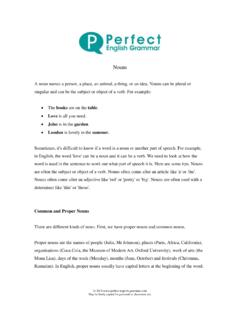Transcription of Level A1 Word List
1 WORD LIST FOR LEVELA1 This publication has made use of the English Vocabulary Profile. This resource isbased on extensive research using the Cambridge Learner Corpus and is part of theEnglish Profile programme, which aims to provide evidence about language use thathelps to produce better language teaching for more electronically by Efthimios !Culturally Sensitive Word+ two objectsA verb that has two noun: a noun that has both singular and plural usually no plural or UCountable noun which usually has no plural or uncountable verb: a verb that has no verb: a verb that has an noun: noun with no plural form.
2 Cannot be used with 'a', 'an', or 'one'.UKBritish EnglishUSAmerican EnglishabbreviationA short form of a word or word that describes a noun or word that describes or gives more information about a verb, adjective or other in a positive way, to show that you have a good opinion of someone or verbThe verbs 'be', 'have' and 'do' when combined with other verbs to make different nounAn adjective that always comes before a word used to join parts of a phrase or used before noun or adj to show which person or thing is being referred in a negative way.
3 To show that you have a bad opinion of someone or word or phrase that you say loudly or suddenly to express strong in serious writing, or for communicating with people in a serious or polite in relaxed situations, for example with friends and family. Used more in in books and poems, and not in ordinary verbVerb such as can, might, must. With another verb, shows an idea such as word that refers to a person, place, idea, event or passiveIn a passive verb/sentence, the subject does not do the action but is affected by pluralRefers to more than one person or verbVerb with an adverb or preposition, with meaning different from meaning of its to more than one person or used before noun, pronoun or -ing form of verb to show place, direction, word used instead of a noun.
4 Which has usually already been talked in connection with a particular area of work or sign, shape or object used to represent something word that describes an action, condition or abbreviationA short form of a word or phrase only used in writing56Aa /e / (ALSO an)DETERMINERNOT PARTICULAR used before a noun to refer to a single thing or person but not a particular thing or person or not one that you have referred to beforeDictionary examples:She's got a left an umbrella here he a friend of yours?Learner example:You can make a quick snack, for example a to mean any or every thing or person of the type you are referring toDictionary examples:Can you ride a bike?
5 A child needs cheetah can run faster than a example:I don't need it because I'm too old to have a examples:a hundred dollarsa dozen eggsLearner example:Dear Ally, All my friends [from] school were here, more than a hundred to state what type of thing or person something or someone isDictionary examples:Sally's an 's a example:She's a / ba t/PREPOSITIONSUBJECT relating to a particular subject or personDictionary examples:What's she talking about?I've got a book about example:I like my IT course becaus[e] I want to learn about little more or less than the stated number or amountDictionary examples:It happened about two months ago.
6 "What time are you leaving work today?" "About five."Learner example:It's not far [from] my home, about 20 minut[es'] walk, [or] 5 minut[es] by / b v/ADVERB; PREPOSITIONHIGHER POSITIONin or to a higher position than something elseDictionary examples:There's a mirror above the name comes above mine on the example:I think I have [put] it above the / dres/NOUN [C]BUILDING DETAILSthe details of where a building is, including the building number, road name, town, examples:her business/home addressa change of addressLearner example:Pl[ease] tell me your series of letters, numbers or punctuation marks referring to a website or email destinationDictionary example.
7 Do you have their Web address?Learner [This] is my new e-mail address: xxxxxxxxxadult / d. lt/NOUN [C]a person or animal that has grown to full size and strengthDictionary example:Adults pay an admission charge but children get in example:Dear Jo, The class day is Wednesday for children (8-16[s]) and Tuesday for / r/PREPOSITIONTIME/EVENT when a time or event has happened9 Dictionary examples:Shall we go for a walk after breakfast?We had a chat after the 's get the shopping. After that, we can stop for a a while, I began to like birthday is exactly a week after was so boring, I left after ten example:You can go shopping, eat [a tasty] meal and after that you can go to the disco and dance all / nu n/NOUN [C or U]the time between the middle of the day and the eveningDictionary examples:It was a sunny works three afternoons a week at the 's go to the park this 's coming round on Wednesday 's been in a bad mood all example.
8 She cooks every / ge n/ADVERBONE MORE TIME once moreDictionary examples:Could you spell your name again, please?Throw it away and start example:Thank you /e d /Word family:Nouns: age, agesAdjectives: aged10 NOUNHOW OLD[C or U] the number of years that someone has lived, or that something has existedDictionary examples:I'd guess she's about my 're the same was 74 years of age when she wrote her first left home at the age of show appeals to people of all example:She is the same age as / l/DETERMINER; PRONOUNEVERY ONEevery person or thing in a groupDictionary examples:I've seen all of his of us had left by 's got four children, all under the age of five.
9 "Which of his books did you like best?" "I loved them all."Learner example:I hope you are all TIMEthe whole of a period of timeDictionary examples:I've been studying all 's rained all 've been waiting all afternoon for him to example:I spent all day [at the] right / l ra t/ADJECTIVE [NEVER BEFORE NOUN]; ADVERB (ALSO alright)WITHOUT PROBLEMS happening successfully or without problemsDictionary examples:Did the interview go all right?Did he do all right in his exams?Did you get home all right last night?Learner example:Tomorrow I have [the] day off, so everything is all right!
10 EXCLAMATION used to agree to a suggestion or requestDictionary examples:"How about going out for dinner?" "All right.""Can we leave at six?" "All right."Learner example:All right, tomorrow you get my jacket and wait for me at the bus / l ra t/EXCLAMATION used to agree to a suggestion or requestDictionary examples:"How about going swimming?" "Alright.""Would you look after the children?" "Yes, alright."also / /ADVERBin additionDictionary examples:She's a photographer and also writes 'm cold, and I'm also hungry and example:I also have a dog and I like to go for a walk with [him].
